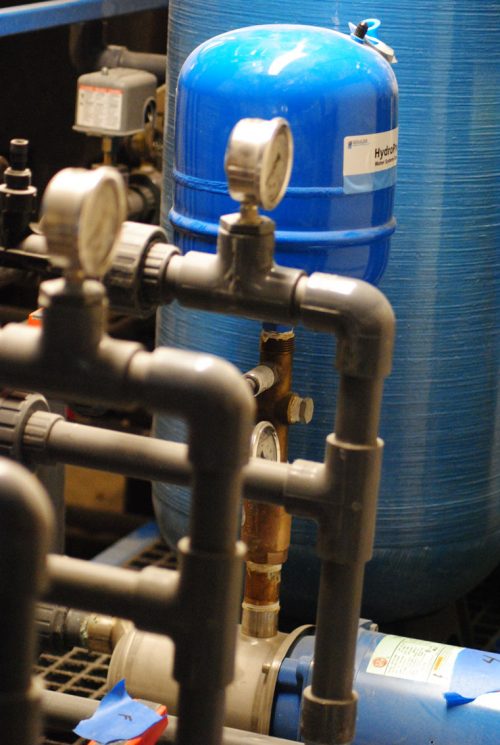
The opening of the Idyllwild Brewpub is still in the future. But when its taps do pour many special-craft brews, residents should enjoy the local libations as well as be proud of the effort to build one of the most technologically advanced and environmentally considerate businesses on the Hill.
From providing the purest water available to its brews to applying state-of-the-art cleaning and recycling processes to the product that remains after the beer is kegged, the Brewpub will represent a true 21st century entity.
In the beginning of the pub’s construction and of the beer brewing, Don Put, head brewer of the Brewpub, will use pure mountain water drawn from the pub’s own well.
The volume of water the Brewpub will consume is about 0.3 percent of the Idyllwild Water District’s average water production this year. Put estimates that the maximum monthly use will be about 20,000 gallons, which is less than the largest water consumers in IWD now.
“The well is sufficient to serve whatever the restaurant and the pub need,” Put said. No treatment of the well water is necessary. Put will use the same testing protocols as IWD, which is every three months he will conduct a bacterial panel. “We are basically our own water company,” he said.
Water is a vital ingredient of the pub’s product. “Beer styles are a direct result of the water that brewers have access to,” Put stressed. “Idyllwild water is like a blank canvas for brewers.”
The output from the pub will exit through modern wastewater treatment equipment intended to protect the local environment and water table. “We want clean brewery effluent,” Frank Ferro, local restaurateur, said.
“Our goal is not to send any wastewater to IWD unless we have to do that,” Put emphasized. “Ideally, we will treat it on site for use for irrigation.”
In March, when IWD and the Brewpub signed a memorandum of understanding, General Manager Tom Lynch concurred: “In many respects, the pre-treated material that will be released will be beneficial to the wastewater treatment process at the plant.”
The MOU will regulate the Brewpub’s discharge of effluent into IWD’s wastewater collection system. The MOU specifies several key points, including that the Brewpub’s discharge will be retreated.
Also, any discharge will occur between Monday and Friday, excluding weekends, which are already IWD’s peak wastewater surge periods. The weekly total is limited to 2,000 gallons and no more than 400 gallons in one day without prior permission. Any discharge will occur after 8 p.m., which places less demand on the IWD facility.
The MOU was a product of negotiations between the Brewpub, the district and IWD’s wastewater consultant, Wyatt Troxel, whose report a year ago verified how the Brewpub’s discharge would help IWD’s waste-treatment system.
The beer waste will travel through a receiving tank, aerobic digesters, then a settling tank, and move through both an ozone and ultraviolet cleansing processes. This water will be clean enough to be dispersed around the pub for irrigation to protect and enhance the vegetation.
Put has been working with state and county health officials to establish criterion for the wastewater. Biological oxygen demand, chemical oxygen demand, nitrogen content and total dissolved solids will be closely monitored.
“We expect they will hold us to the same limits as IWD,” Put stressed. The only breweries with this type of reclamation technology are some of the largest in the state, such as Stone Brewery in Escondido and Sierra Nevada in Chico, he added.
The spent grain, a brewing product, will become cattle feed available to several farms and ranches in Anza.
The spent yeast is planned to become compost to be used on site. Ferro added, “If there is enough, we can share with the community.”
In addition to their concern about safe and clean water in and out of the pub, energy is another concern. To minimize the pub’s demand from the electric grid, solar panels have been installed on the roof. These are capable of supplying between 75 and 80 percent of the facility’s electricity.
Finally, the lighting will be LEED compliant, too.
“Everything will be green,” Put declared. Except the beer.











Not even for Saint Patrick’s Day?